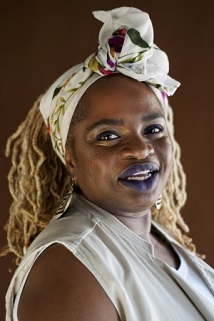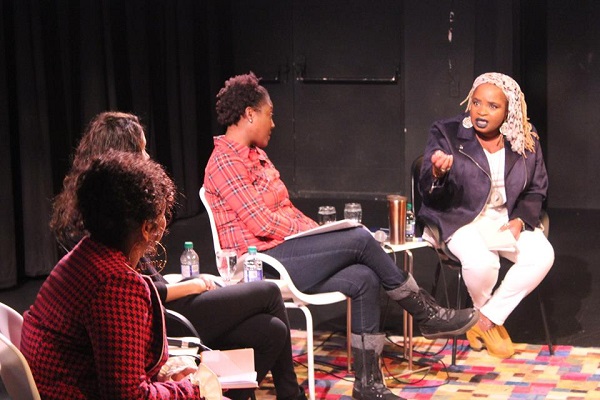Dr. OmiSoore H. Dryden, an interdisciplinary scholar working at the intersections of health science, social science and humanities, has been named James Robinson Johnston (JRJ) Chair in Black Canadian Studies at Dalhousie.
The James Robinson Johnston Chair in Black Canadian Studies is an endowed national senior academic chair, established in Halifax to honour and recognize the unique historical presence of African Nova Scotians.
Esteemed holders of the JRJ Chair have been located throughout various Dal faculties, including Law, Health and Arts and Social Sciences. With Dr. Dryden as Chair, the Chair will now be located in the Faculty of Medicine’s Department of Community Health & Epidemiology.
Theorizing Black Health Studies in Canada
Dr. Dryden earned her PhD in Social Justice Education from the Ontario Institute for the Study of Education and the University of Toronto, where her dissertation examined how blood donation rules discriminate against certain populations. She has served as an assistant professor and Chair of the Women’s, Gender, and Sexuality Studies Department at Thorneloe University (Ontario) and as a visiting professor in the Faculty of Community Services at Ryerson University.
 Dr. Dryden will help the Faculty of Medicine strengthen Dalhousie’s institutional priorities to enhance diversity, foster community outreach, and build a health research mandate that is collaborative, interdisciplinary and nationally recognized.
Dr. Dryden will help the Faculty of Medicine strengthen Dalhousie’s institutional priorities to enhance diversity, foster community outreach, and build a health research mandate that is collaborative, interdisciplinary and nationally recognized.
“How do cultural and historical notions about medicine and racial bias in the health and medical system shape the health prospects of Black people and the society as a whole?” she asks.
“Public health discourse have, at times, framed the body as dangerous, with some bodies presumed to be more prone to risk and vulnerability to disease; and thus pose a greater danger to the rest of society. My research seeks to understand how the interlocking systems of oppression (through racism, gender, and sexuality) influence the health experiences of Black people in Canada.”
Dr. Dryden’s research has been published in various peer-reviewed journals and books. She has been a Researcher-In-Residence with the Ontario HIV Treatment Network, and has received research grants from Canadian Blood Services and the Public Health Agency of Canada.
Joining a distinguished history
Dr. Dryden joins an esteemed legacy in becoming the latest James R. Johnston Chair.
Established in 1991, the Chair connects local black communities with a national and international perspective. The goal of the Chair is to develop Black studies in Canada, develop a program of research on Black peoples in Canada, and the African Diaspora, and create bridges between academia and the wider African descended communities.
The chair is named after James Robinson Johnston (1876-1915), the first African Nova Scotian to earn a Dalhousie degree (Bachelor of Letters, 1896) — in fact, the first African Nova Scotian to graduate from any university — and the first Black lawyer to practice in Nova Scotia. Despite his short life (he died at age 38), he represented, as historian Judith Fingard notes, “the apogee of 19th-century African Nova Scotian ambitions.”
In July 1996, Esmeralda M.A. Thornhill, a tenured full professor of law at Dalhousie University, was appointed the first scholar to anchor and pilot the distinguished James Robinson Johnston Endowed Chair in Black Canadian Studies. Dr. Thornhill is a lawyer, linguist, lecturer, educator and writer who has worked in the human rights field of anti-racist education since 1977. She was followed in the role by health researcher David Divine, who brought his extensive experience spanning two decades in community development issues to the role, operating at practitioner, policy, and academic levels.

Kuumba: Journey to Black Liberation Symposium. "Womanism, Black Feminism and the Politics of Love" (Feb. 2018) with Dr. Erica Lawson, El Jones and Rania El Mugammar. Picture by Mr. Brandon Hay.
The most recent Chair was scholar, author, and a dub poet Dr. Afua Cooper, who set out a goal to raise the profile of African Nova Scotian history to Nova Scotians and Canadians:
“People want to know, what is Black Canadian studies? What are we going to do with it? How are we going to bring such a branch of knowledge to the forefront? It's been a branch that's been marginalized and subjugated and as chair, it's imperative I bring this to the fore,” said Dr. Cooper.
Dr. Cooper used her position as Chair to voice to the various groups that make up our community, through spoken and written words. During her tenure, she founded the Black Canadian Studies Association (BCSA), which she currently chairs and co-founded of the Dub Poetry movement in Canada.
"I'm thrilled to be appointed the new JRJ Chair, and to be given this great opportunity to work closely with African Nova Scotian communities, and my colleagues in Community Health & Epidemiology," says Dr. Dryden. "I appreciate the trailblazing work of Dr. Cooper and the generous commitments made by the Faculty of Medicine. I'm excited about the many opportunities for university-community engagements and building on, and expanding, the contributions made by Black and African Canadian people in the fields of medical and health studies, research, and education."
As with many other aspects of the Chair’s work, the hiring of Dr. Dryden was community-focused. The academic search committee had representation from the Dalhousie Black Faculty Caucus and Black student representation. The community presentation asked of each candidate also played an important part: The Delmore “Buddy” Daye Learning Institute (DBDLI), in its capacity as the Africentric education and research Institute, and in partnership with Dalhousie University, hosted an African Nova Scotian Community Meet & Greet with each of the three candidates last fall. In this open forum, the public had an opportunity to meet the candidates and talk about their research and community health needs.
Comments
comments powered by Disqus

